Dead or dying deer in the neighborhood? Here are your options

UPDATED 11:25 a.m. with comment from WDFW on carcasses attracting wolves.
WILDLIFE -- The drought-related outbreak of bluetongue that’s killing white-tailed deer in the region by the hundreds, is adding urgency to a commonly asked problem:
“What do we do with the dead or dying animal in our neighborhood?”
Here are some guidelines:
Inland Northwest Wildlife Council members (487-8552) licensed for big-game recovery will respond in the Spokane region (with the exception of the city of Spokane Valley) to salvage meat from freshly road-killed animals for the needy. They also are state-certified to euthanize dying game.
“Beyond that, it’s a case-by-case scenario for us,” said Wanda Clifford, council executive director.
“We can put an animal down if it’s suffering, but we’re not going to salvage one with spoiled meat or one that’s obviously sick. We don’t just collect roadkill. That’s the job of the road or highway crews. And nobody picks up carcasses off private property.”
County Sheriff’s deputies may respond to euthanize dying animals in some cases, but they do not collect the carcasses.
Department of Transportation crews (324-6000) pick up on state highways.
Spokane County road crews (477-3600) pick up on county roads.
City of Spokane (755-2489) will pick up carcasses in a city road right of way within 24 hours, weekends excluded. The hotline for reporting illegal garbage dumping in the city also can be called, 625-6083.
City of Spokane Valley (921-1000) takes reports of dead big game by phone or online at spokanevalley.org/cares.
State Fish and Wildlife officers respond to poaching-related cases (call 911 or the county sheriff dispatch). The agency asks the public to report sick or dead big game (892-1001), but staff normally won’t pick up carcasses.
Animals that die on private property generally are the responsibility of the property owner, although exceptions may be made for large animals such as moose.
“If it's on private property in a rural area where natural scavengers like coyotes, ravens, etc. will clean up the carcass, it can remain there,” said Madonna Luers, Fish and Wildlife department spokeswoman. “If the carcass is too close to a residence, it can be moved to a more remote part of the property but we advise using protective gear like gloves before handling.
“If the carcass is on private property in an urban area, it can be transported to a dump, or to other rural property where permission has been obtained to leave it.”
Before transporting an game animal, call the department regional office so enforcement officers can be notified to avoid any misunderstandings, she said.
It’s illegal for the public to collect dead wildlife along roads for personal use.
- Dead domestic animals found in the city or county should be reported to SCRAPS, 477-2532.
A note regarding carcasses attracting wolves:
Some readers have suggested the Washington Fish and Wildlife Department is saying one thing about leaving deer to scavengers in rural areas while telling other guidelines to ranchers about properly disposing of livestock carcasses to avoid attracting wolves near sheep and cattle.
Here's a clarification from Luers:
Wolves, coyotes, cougars, bears and many other wildlife species normally feed on deer, including carcasses they scavenge. As wildlife managers, we WANT them to feed on other wildlife, and NOT on domestic livestock. We DO discourage disposal of multiple deer carcasses near livestock herds or flocks. We work with producers to prevent wild carnivores from preying on their livestock in a number of ways, including secure confinement of sick animals and burying animal carcasses.
